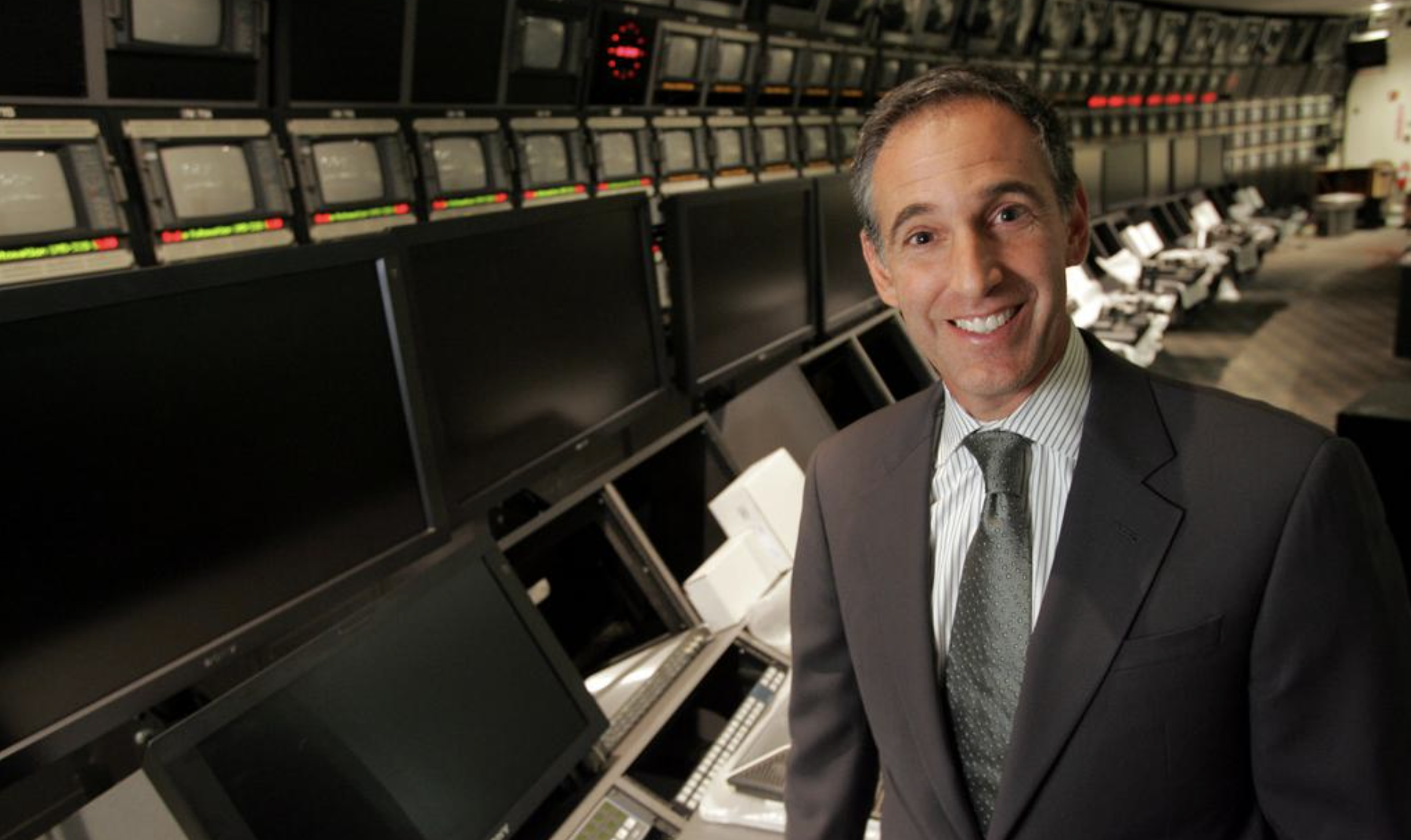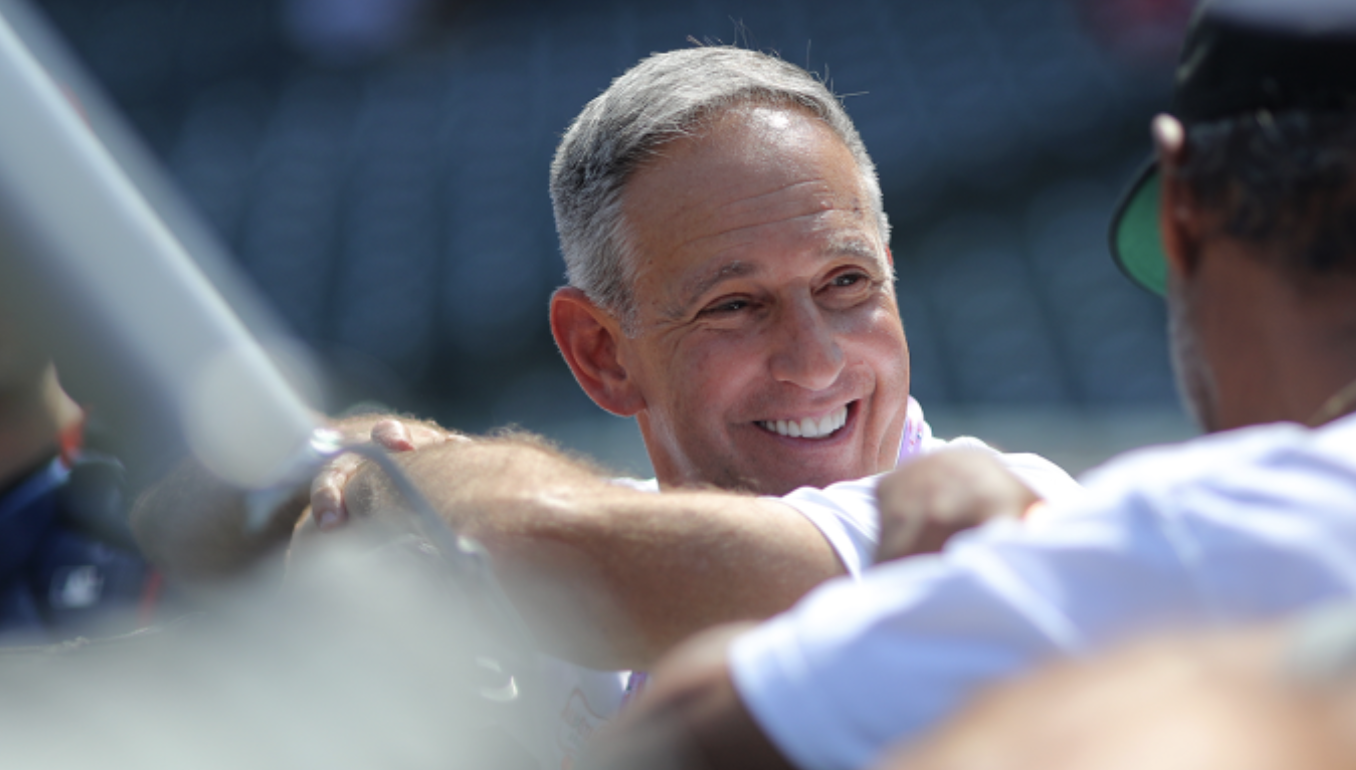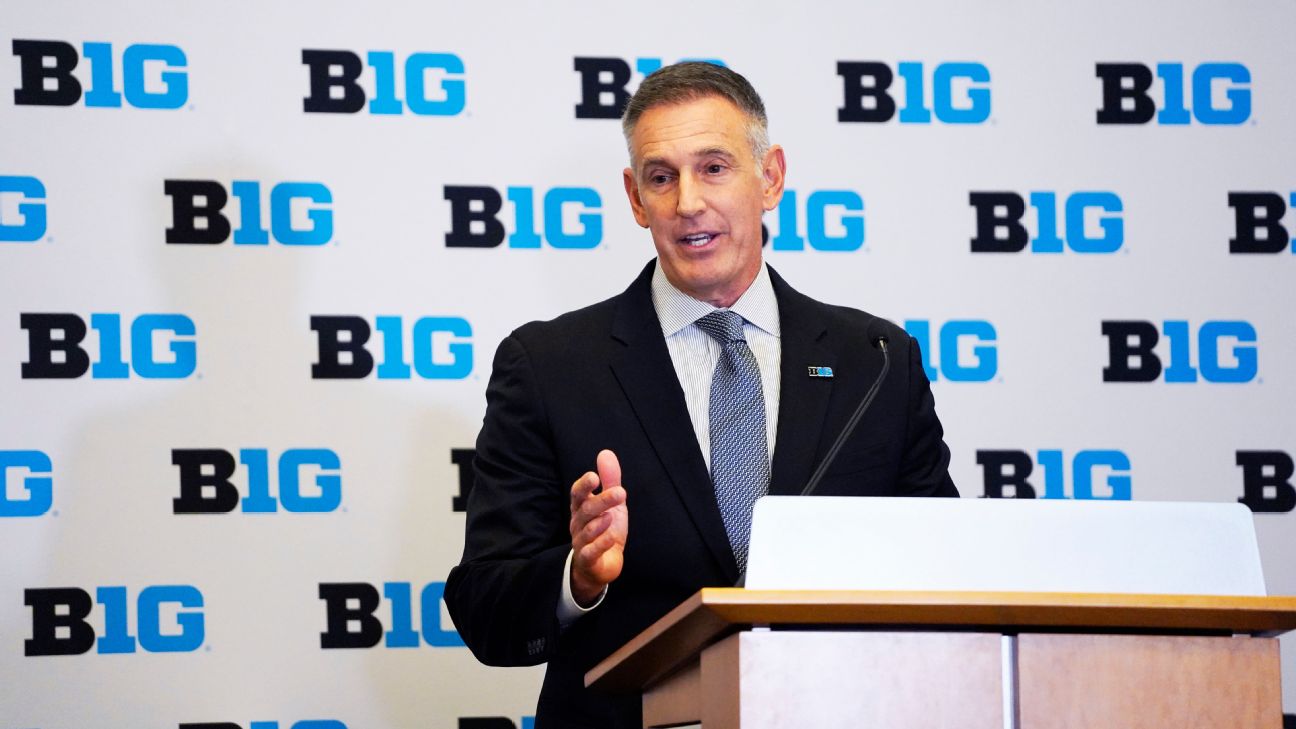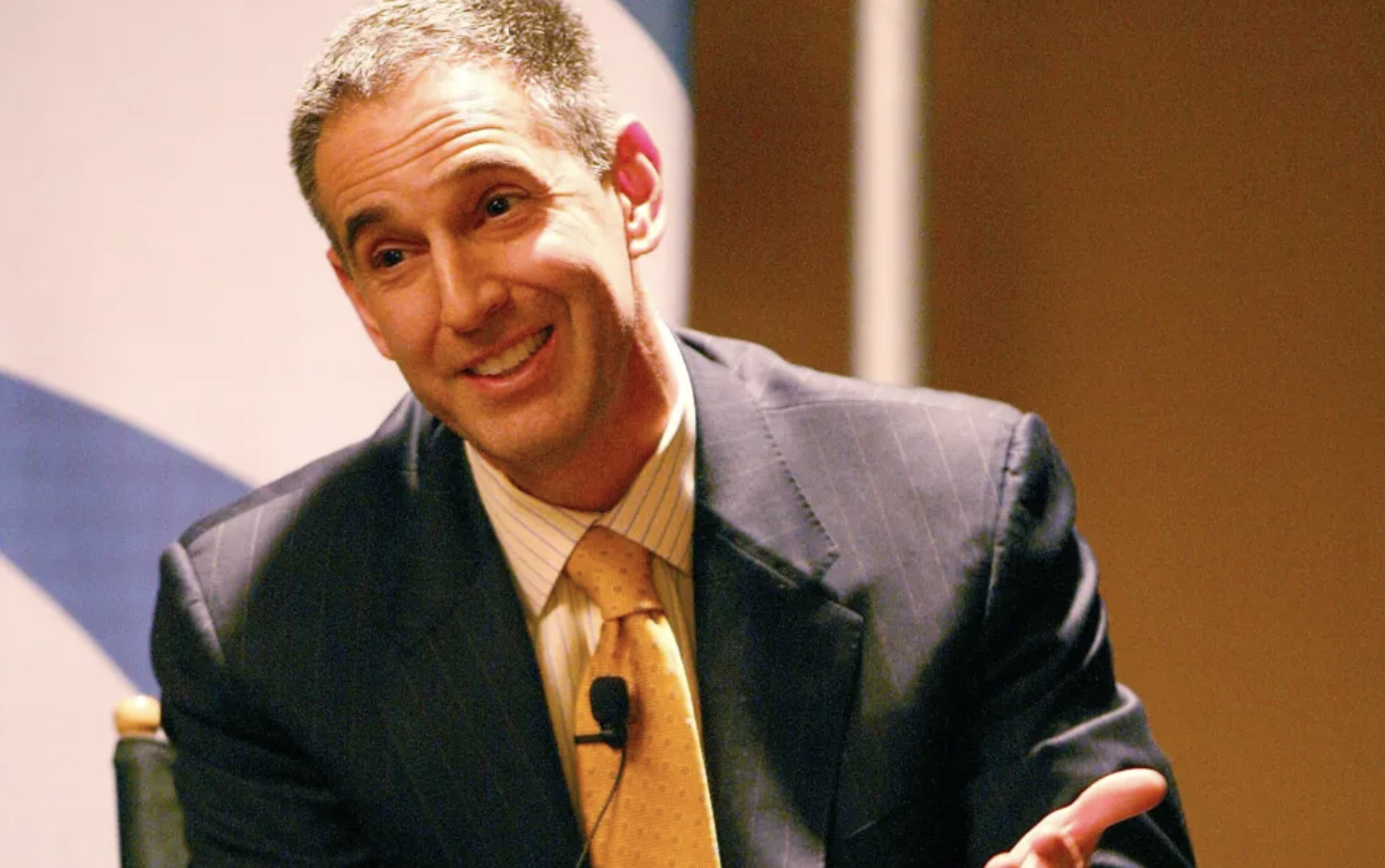Tony Petitti
Management
Year Inducted: 2023
In the storied history of sports broadcasting, few stories are as expansive as that of Tony Petitti’s career. With key roles overseeing programming and production, running TV networks on the local and national level, in Major League Baseball’s front office, in corporate America, and, now, as commissioner of the Big Ten Conference, Petitti has seemingly done it all in more than three decades in the business. And he has done it all while maintaining his status as one of the most respected and esteemed figures in the industry.
“I don’t know of anyone in our industry who has the combination of street smarts and management skills that Tony does,” says CBS Sports Chairman and Hall of Famer Sean McManus. “Above all else, you will never find a better father, son, or friend. No one deserves to be inducted into the Hall of Fame more than Tony.”
A 14-time National Sports Emmy Award winner, Petitti has played a vital role in the success and evolution of the sports-broadcasting business while serving in senior executive roles at CBS Sports, ABC Sports, MLB Network, the MLB Commissioner’s office, and the Big Ten Conference.
“Tony has had an unbelievable career spanning more than three decades,” says The Montag Group’s Sandy Montag, a close friend and advisor. “From working in production to starting a network, to being a deputy commissioner, and now as a commissioner, he has been a dedicated, hardworking, and loyal teammate who has a great reputation and will leave a lasting legacy on our industry.”
Learning the ‘ABCs’ of Sports Television
The son of first-generation American immigrants, Petitti grew up in Queens, NY, playing baseball and regularly heading to the ballpark with his father, a New York City police officer. He went on to play Division III ball at Haverford College, catching behind the plate for four years before heading to Harvard Law School. After receiving his law degree, Petitti served a short stint at the law firm of Cadwalader, Wickersham and Taft before kicking off his career in broadcasting in 1988 as a general attorney for ABC Sports.
“I came into it with no background in [broadcasting] at all,” recounts Petitti. “I was learning as fast as I could over those first couple years. That’s when I learned what went into creating a telecast in terms of programming, production, sales, and so on. Plus, I loved the ABC Sports broadcasts as a kid, and, suddenly, I was going into an office every day with pictures of Jim McKay, Howard Cosell, Frank Gifford, and Keith Jackson on the walls. Just to be in that space that early in my career was pretty remarkable.”
Petitti’s legal career would come to an end when he took a position in the programming department at ABC Sports, eventually working his way up to VP of programming. He oversaw the acquisition and scheduling of college football and basketball, track and field, and NASCAR events and led the charge to expand coverage of the Little League World Series on ABC and the ESPN family of networks.
His biggest contribution at ABC Sports was likely his work alongside Southeastern Conference Commissioner Roy Kramer in creating college football’s first No. 1 vs. No. 2 postseason championship game. After years of tireless negotiations with college commissioners, presidents, and athletic directors, the vision became reality in 1998 with the formation of the Bowl Championship Series to determine college football’s national champion.
“The biggest issue was that the Rose Bowl had an enormous tradition of having [exclusively] the PAC 10 and the Big Ten involved. He was able to bring them to the table to at least listen,” says Kramer. “It changed everything we had known as far as the postseason was concerned in college football.”
The Tiffany Network Revival: Rebuilding CBS Sports into a Powerhouse
In 1997, Petitti joined CBS Sports, teaming with newly appointed President Sean McManus to rebuild the Tiffany Network sports portfolio after it lost its NFL rights package. As senior VP, business affairs and programming, his management responsibilities included all contract negotiations and future acquisitions. In addition to playing an instrumental role in returning the NFL to CBS, he built up such core events as The Masters, NCAA March Madness, SEC football, the PGA TOUR, and US Open tennis.
“Sean was essentially charged with rebuilding CBS Sports, and the way to do that was to get the NFL back,” says Petitti. “I helped to lead the team and worked closely with Sean, spending every day for more than a year [strategizing about] how to get the NFL back and make CBS Sports stronger. It was an amazing experience to be part of that CBS Sports resurgence. With Sean leading the way, we changed the course of CBS Sports from that point forward.”
In 1999, Petitti’s career took an unexpected detour when CBS Television CEO/President Mel Karmazin asked him to take over as VP/GM of WCBS-TV New York despite his having no experience in local television. Though new to the local-news game, Petitti went on to oversee the transformation and reshaping of the CBS flagship station, including acquiring the over-the-air rights to broadcast New York Yankees games and helping to guide he station through the tumultuous days of 9/11 in 2001.
Though continuing in a “special advisor” role to McManus during three years at WCBS-TV, Petitti would return to CBS Sports full-time in 2002, serving as executive producer and, eventually, executive VP. It was during this period, he says, that he “really fell in love with production and storytelling.”
“Tony Petitti has always had one of the most innovative minds from the production side of the business,” says Sports Broadcasting Hall of Fame Chairman Ken Aagaard, who worked alongside Petitti as VP, operations and engineering, at CBS Sports. “His desire to see a high-frame-rate camera on a golfer’s swing created and initiated a staple of these types of cameras on all sports events. He was always capable of providing a vision and direction of how best to use technology. He instantly could see how new and different elements, graphics, and music can enhance the storytelling. Nobody better at it.”
All Baseball, All the Time: The Birth — and Growth — of MLB Network
 In 2008, Petitti left CBS for the opportunity to launch a cable sports network from scratch at MLB Network. Named president/CEO in July 2008, he was tasked with assembling a team and building out a 24/7 cable operation in less than six months to meet the launch date of Jan. 1, 2009.
In 2008, Petitti left CBS for the opportunity to launch a cable sports network from scratch at MLB Network. Named president/CEO in July 2008, he was tasked with assembling a team and building out a 24/7 cable operation in less than six months to meet the launch date of Jan. 1, 2009.
“From the very beginning, which was Jan. 1 of that year, he did remarkable work and turned the network into the ultimate television destination for baseball fans across the country and around the world,” says MLB Commissioner Emeritus Bud Selig, who hired Petitti to run the network. “Tony’s work was a great benefit to the game. Congratulations to Tony — it is certainly well-deserved.”
Petitti led the creation, buildout, and launch of MLB Network in 50 million homes — at the time, the largest launch of a cable network in history.
“Tony’s unique combination of creative and business vision made him the perfect person to chart MLB Network’s launch,” says Rob McGlarry, who succeeded Petitti as the network’s president/CEO in 2014. “Being part of his team in those early days, when everything was new — including graphics, broadcasters, production technology, sets, and programming schedules — is something for which I will be forever grateful.
“Tony’s passion inspired everyone to try to make MLB Network better each day they came to work,” McGlarry continues. “I’ve often joked with him that he made everyone feel like they were the most important person at the company, but it’s true.”
From 2008 to ’14, Petitti’s vision touched every aspect of content and operations: programming, on-air talent, production team, studio creation, technical facilities.
“You can’t walk around MLB Network without seeing Tony Petitti,” says Susan Stone, senior VP, operations and engineering. “His legacy is in every corner of Studio 21, in every corner of Studio 42, and in every corner of Studio 3, including MLB Tonight.”
Petitti’s strategy for launching the network involved building a marquee primetime studio show and “working backward from there.” That program, MLB Tonight, helped revolutionize the industry with a first-of-its-kind studio, on-air talent doing live demos on a regular basis, and whip-around style rarely seen in sports television at the time.
“When he told me in October 2008 that we were going to do a show from 6 p.m. until 2 a.m. or the last out on the West Coast, we all sort of went, ‘Gulp,’” remembers Stone. “[He said] the show was going to be like March Madness as if we are walking the dog between baseball games, and we did it. That’s what MLB Tonight has become. It’s our flagship [program] and a big part of our legacy, as are so many things at MLB Network from the vision of Tony.”
In the Commissioner’s Office: Innovation On and Off the Diamond
 When Rob Manfred took over as MLB commissioner prior to the 2015 season, he brought Petitti in as deputy commissioner and COO. During six years in the role, Petitti played an integral role in leading broadcast and digital media, special events (All-Star Game, Home Run Derby, and MLB Postseason), MLB Network, MLB social media, consumer products and licensing, marketing, youth development, and more.
When Rob Manfred took over as MLB commissioner prior to the 2015 season, he brought Petitti in as deputy commissioner and COO. During six years in the role, Petitti played an integral role in leading broadcast and digital media, special events (All-Star Game, Home Run Derby, and MLB Postseason), MLB Network, MLB social media, consumer products and licensing, marketing, youth development, and more.
He also participated on MLB’s Competition Committee and closely collaborated with 30 MLB team owners and presidents and with key business and operational partners to incorporate ideas and feedback to improve creation and execution of strategic initiatives.
“For more than a decade,” says Manfred, “Tony was one of the most important and influential people in baseball — first at MLB Network and then with me in the Commissioner’s Office. Tony is truly the father of MLB Network; there would be no MLB Network, certainly not of the quality that we have today, were it not for him. He also left an indelible mark on the game, and MLB Network was just the first chapter in that story.”
Among his key contributions were the revised MLB Playoffs format and the launch of special events like the MLB Little League Classic in Williamsport, PA; the MLB London international series; MLB Fort Bragg Game, and the unforgettable MLB at Field of Dreams game in Dyersville, IA.
“The whole series of games that we play [at non-MLB] stadiums — Fort Bragg, Field of Dreams, Williamsport, and so on — was all Tony Petitti from day one,” says Manfred. “He was very creative in how we could present the game, so all those initiatives really belong to Tony.”
Big Ten and Beyond: A New Adventure in the College Ranks
 After a brief stint as president of Activision Blizzard following his time at MLB, Petitti brought his wide-ranging experience to his biggest role to date in May 2023 when he was named the seventh commissioner in Big Ten Conference history.
After a brief stint as president of Activision Blizzard following his time at MLB, Petitti brought his wide-ranging experience to his biggest role to date in May 2023 when he was named the seventh commissioner in Big Ten Conference history.
While some in the industry were initially surprised by his selection over other veterans of the college-sports sector, Petitti has made a career of succeeding in unfamiliar waters and says he’s more than equipped for the challenges ahead.
“I’ve always tried to surround myself with great people and give them as much meaningful responsibility as possible,” he says. “People did that for me even when my résumé didn’t necessarily warrant those responsibilities. I benefited from that and feel strongly about it to this day. If you work with great people, empower them to do their jobs well, widen their responsibility as much as possible, and let them grow, then you’re going to succeed.”
For former Big Ten Commissioner Jim Delany, who has known Petitti since the early ’90s and remains close to him, “it would be hard to see a Broadcasting Hall of Fame without Tony Petitti represented.”
While that Hall of Fame career is inspiring, Petitti considers his proudest achievements in life to be his two daughters: Danielle, a Vanderbilt University graduate residing in London, and Ally, a graduate of the University of Southern California who lives in Los Angeles. He also credits his mother and father with instilling in him the importance of hard work and resolve, as well as for the sacrifices they made to provide Petitti and his sisters with opportunities for success.
Now at the Big Ten, as he undertakes the next chapter in an epic novel of a career, Petitti enters a Hall of Fame filled with many of his idols, mentors, and peers. Looking back on nearly four decades in the business, he hopes to be remembered as “someone who brought great passion for sports, love for the media side, and great energy all around. I was lucky to work in places where people genuinely love their work — whether it’s ABC, CBS, MLB Network, MLB, or the Big Ten. If I left something behind that made that connection stronger for the people who worked there or made it more exciting to be a part of, then that’s what I’m most proud of in my career.”

